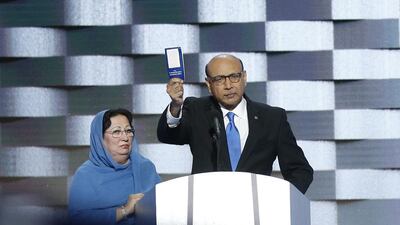On July 26, Hillary Rodham Clinton made American history by becoming the first woman ever to receive a presidential nomination from a major party. On July 27, like so many other women around the world, she was erased from her own story.
That morning, across the front pages of some of the country’s newspapers, the news of her nomination was not illustrated as is customary with her picture, but with the picture of her husband Bill Clinton.
A woman’s voice was stifled in favour of a man’s. It’s a story that is far too familiar to women everywhere. As a woman, you may notice that no matter how much you say something, it’s just not heard, but when the same thing is said by a man, all ears perk up.
Women’s rights activists – both men and women – work hard to ensure that women’s voices are heard, fighting embedded cultural norms about what women can say, where they can speak and how much of what they say is heard and given credence.
Days later, Donald Trump made his now infamous remarks about Ghazala Khan, the mother of Captain Humayun Khan who died fighting in the US military. She stood silently on stage at the Democrats convention, clearly stricken with grief, as her husband spoke. She wrote later in The Washington Post that she had not spoken for fear of overwhelming emotion. "I could hardly control myself. What mother could?"
But in one short sentence, Mr Trump dismissed a mother’s grief and disparaged millions more women. “Maybe she wasn’t allowed to have anything to say,” as though her faith as a Muslim was the problem. Here, writ large, is the hatred of others that has burst forth in America and around the world, which doesn’t see Muslims as human beings who shed the same blood and grieve with the same grief.
Mr Trump erased her story in favour of his own. He also erased the voices of Muslim women around the world. But they refused to be erased.
The Twitter hashtag #CanYouHearUsNow went viral, as Muslim women started tweeting about their achievements. Their voices and pictures were incredible, and the diversity and strength of their voices was picked up by the media.
It is bittersweet that such social media campaigns by Muslim women are increasingly common, full of wit, self-expression and most of all full of the fact that Muslim women have their own voices, ambitions and achievements. It brings a smile to our faces when the bigotry expressed by Mr Trump and so many others is slapped down by feisty Muslim women. But it’s also disheartening that it has to be done over and over again.
But there should not be an onus on women to prove how independent, vocal and public we are. Part of the choice – just as Ghazala Khan asserted – should be the choice to remain silent.
What is even more disheartening is that the wider sisterhood has not joined in the campaign. After all, as the example of Mrs Clinton shows, the erasure of women’s voices is not a problem unique to Muslim women. The hashtag was well chosen because the question still stands for all women. It’s an indictment of us all that women wherever they are in the world still need to ask the question: “Can you hear us now?”
Shelina Zahra Janmohamed is the author of Love in a Headscarf

